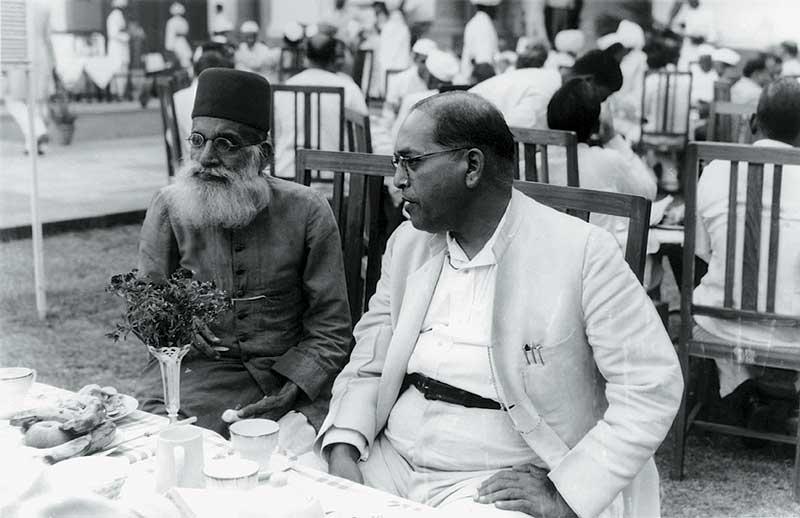While a lot is made of his love for Krishna and 11 Hajj pilgrimages, his contradictions and shifting positions, what gets obscured is the quality of his poetry and his Sufi-like sincerity to the cause of humanity.
Salim Arif
Known by the sopbriquet Raees-ul-Mutaghazaleen (The Lord of Ghazal Writers), Maulana Hasrat Mohani can be credited with revitalizing the poetic form with a new flair in the 20th century.
Classical in nature, his poetry brought in fresh, everyday feel to subjects of different shades and stages of love, with nostalgia and reflection, creating moments of charming passion.
Chupke Chupke Raat Din Aansoo Bahana Yaad Hai
Humko Abtak Aashiqui Ka Voh Zamaana Yaad Hai
(I remember the days and nights of tears
I remember the times of being in love)
Or his passionate tribute, filled with imagery, to his beloved.
Roshan Jamaal-e-Yaar Se Hai Anjuman Tamaam,
Dehka Hua Hai Aatish-e-Gul Se Chaman Tamaan
(The radiance of my beloved illuminates the assembly,
Flames of the flower, keep the garden ablaze)
Mohani was born on 1 January 1875 in Lucknow. He was given the name Syed Fazl-ul-Hasan and later chose Hasrat Mohani as his pen name as a poet. Perceived as a bundle of contradictions and a maverick by many, Mohani’s interesting journey as an Indian nationalist with phased memberships of Congress, Muslim League, Progressive Writers Association, ending with his long and historic association with the Communist Party of India (CPI) is worth a revisit. His contradictory behavior, as seen by many, was, for him, the essence of what he believed in: being a Muslim, a communist, an Indian and a human being. To add another interesting facet to this stalwart of Urdu poetry and the Indian political mainstream was his love for Lord Krishna. Referring to Krishna as Hazrat Srī Krishna Alaihi-Rahma, Maulana Hasrat Mohani was also following in the footsteps of poets like Raskhan, Abdur Rahim Khanekhana and Nazir Akbarabadi. He would participate in the Janmashtami celebrations at Mathura with the same enthusiasm and devotion as he would be when performing one of his several Hajj pilgrimages in Mecca.
Kuch Hum Ko Bhi Ata Ho Ke Ae Hazrat-e-Krish,
Aqleem-e-Ishq Aap ke Zer-e-Qadam Hai Khaas
Hasrat Ki Bhi Qubool Ho Mathura Mein Haaziri
Sunte Hain Aashiqon Pe Tumhara Karam Hai Khaas
(Lord Krishna, bless me
For beneath your feet lies the universe of love
May Hasrat’s homage to Mathura be accepted
I hear you are benevolent to all)
Hasrat Mohani got his early education from his village middle school and government high school at Fatehpur.
Rebel Poet
For an excellent academic record, he got a government scholarship and was later enrolled in Muhammadan Anglo-Oriental College later to be known as Aligarh Muslim University. He had made a name for himself as a poet by the time he reached Aligarh. With friends like Maulana Mohammed Ali Jauher and Shaukat Ali, Hasrat Mohani became actively engaged in socio-political discourses and was expelled for his criticism of British Policies thrice before completing his BA in 1901. In July 1903, Hasrat launched the monthly Urdu-e-Mu’alla, a remarkable magazine in the history of Urdu from Lucknow.
Coming under the influence of Bal Gangadhar Tilak, He became a staunch nationalist after joining Indian National Congress in 1904, and was critical of the liberal and moderate section of the party in the Swadeshi Tehreek run by Bal Gangadhar Tilak in 1905. With the political essays he published, Hasrat laid the foundation of political opinion and discourse in newspapers by writing on issues of national importance including radical opinions of Tilak and Aurobindo Ghosh. When Tilak passed away, Mohani wrote a moving elegy to honour him.
The British administration arrested Hasrat again for publishing an article criticising the British Education policy in Egypt on June 23, 1908 in Urdu-e- Mu’alla. Without the facility of pen and paper in the prison, he continued to compose romantic poems as well as manqabat, naat and hamd (devotional poetry) that reflect his versatility as a poet. A man of strong principles and firm beliefs, Hasrat’s poetry became stronger, even more poignant during his frequent prison terms.
Imprisoned several times on charges of sedition, Hasrat Mohani unlike other freedom fighters, was put in C class jail where he was made to work like an ordinary criminal, grinding copious amounts of flour every day.
The Bolshevik Revolution of 1917 became another major influence on Maulana Hasrat Mohani. He was also an active participant in the Khilafat Movement of 1919 and was one of the first Indians to demand complete independence or poorna swaraj, as it was colloquially referred to as, for India at the Indian National Congress session of Ahmedabad in 1921, which was rejected at the behest of MK Gandhi.
That session was also attended by freedom fighters Ramprasad Bismil and Ashfaqullah Khan. Hasrat Mohani coined the most popular slogan of any India’s freedom struggle: Inquilaab Zindabad. The slogan was a rage among revolutionaries including Bhagat Singh and his comrades.
Gandhi Ki Tarah Baith Ke Kaatenge Kyun Charkha
Lenin Ki Tarah Denge Dunia Ko Hila Hum
(Why would we sit and spin wheel like Gandhi
We will shake the world like Lenin)
Comrade Life
Disillusioned with Congress and its ways, Hasrat Mohani became one of the founders of the Communist Party of India and was the chairman of the reception committee of first Indian Communist Conference held on December 25, 1925. A humanist at heart, with Shah Abdur Razzak Bansvi and Maulana Abdul Wahab Firangi Mehli as his spiritual guides, Maulana Hasrat Mohani had a strong religious grounding in the tenets of Islam as well. He had an uncompromising belief in democratic principles including equal rights and status for all. His deep concern for labourers and peasants, the exploitation of the working class came from opposition to Capitalism. He saw the communist movement as a cause of peasants and workers. Mohani strongly identified with the philosophy of communism and saw it in the light of Islam to bring the Muslim population closer to it. A progressive mind with strong understanding of aesthetics in literature, he stood against his Progressive Writers Association friends catering to middle class morality, and scuttled the move to bring a resolution against obscenity in literature in 1945.
After he was expelled from the CPI for unknown reasons, Mohani formed his own ‘Azad Party’ in 1931, whose main aim was to work for a federal form of government. He was also involved with the Muslim League from inception and became active for a while in 1936 only to leave it questioning the two-nation theory of Mohammed Ali Jinnah. After Partition, Mohani opted to remain in India as a strong advocate of Hindu-Muslim unity.
He was a vocal and critical member of the drafting committee of Indian Constitution led by Dr. B R Ambedkar. He criticised Ambedkar for copying from Government of India Act of 1935 and from some other constitutions as well. He was against the nomination of the constituent assembly members on communal lines and advocated for nomination on political grounds and demanded a fresh election for new constituent assembly.
It is difficult to imagine the political position Maulana Hasrat Mohani would have taken today. While a lot is made of his love for Krishna and 11 Hajj pilgrimages, his contradictions and shifting positions, what gets obscured is the quality of his poetry and his Sufi-like sincerity to the cause of humanity. Maulna Hasrat Mohani passed away on 13 May 1951. His principled, austere life is a shining example of an Indian Muslim at ease with living in a pluralistic, multi-religious society, without compromising on his Islamic ways of life.
Salim Arif is a National School of Drama (NSD) alumnus credited with bringing Urdu back into the mainstream Indian theatre.


